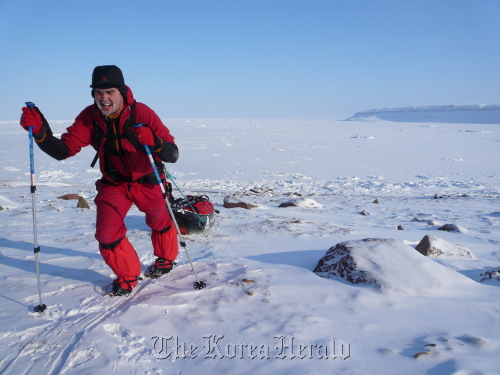One of youngest Britons to climb Everest finds new challenges in Seoul
Almost five years ago, James Hooper was standing at the summit of the tallest mountain on Earth, with best friend and fellow explorer, Rob Gauntlett. Aged 19, they were the youngest Britons ever to scale Everest.
But the adventure did not stop there. The teenagers’ 35,406 kilometer pole-to-pole expedition in 2007, just a year later, took them from the geomagnetic North Pole to the magnetic South Pole using only natural or man power. Aiming to raise climate change awareness, they made their way using skis, bicycles and dog sleds.
Their final great achievement together came in 2008 when they were named National Geographic Adventurers of the Year ― Gauntlett died in an ice climbing accident in the French Alps in January 2009.
Seeming much wiser than his 23 years, Hooper is now in Korea embarking on a very different challenge: learning Korean.
Addressing an audience of the British Chamber of Commerce in Korea at the Grand Hyatt in Seoul, Hooper told of his experiences of adventure and risks, exuding confidence gained from hard-won accomplishment.
“You can’t give yourself the option of giving up,” advised Hooper.
“Put yourself in a situation where to give up would cause you more discomfort than to carry on.”
In the case of his expeditions, for instance, the support, sponsorship and publicity necessary ensured it would have been very difficult for the duo to back out.
“If you really want to do something, and you believe you can achieve it, tell people and go for it,” he said in a telephone interview with The Korea Herald.
They battled not only the physical challenges of these expeditions, enduring extreme temperatures ranging from minus 60 degrees Celsius in Greenland to 48 degrees Celsius in Texas, but also negotiated practical issues, such as acquiring the huge funds necessary to pay for the trips. At times, they also faced skepticism due to their young age as they began preparing for Everest at 16. But this, he said, only spurred them on.
“We were very young and naive when we first decided to do it so I kind of don’t blame them really … but at the same time, if someone says they’re going to do something it’s important to support them,” he added.
 |
James Hooper in Northwest Greenland on the 180 Degrees Pole-to-Pole expedition. (180 Degrees Collection) |
For Hooper, if after considering risks you believe you can overcome them, then you should put everything you can toward your goal. It’s important to accept that problems will arise, but, he said: “Learn from your mistakes. It’s unlikely that you’ll hit it (the challenge) smack bang on the head first time and in that case you just have to learn and go for it again.”
He also feels passion is important: “If people see that you’re really energetic and inspired by what you’re doing, people love energy ― they’ll be attracted to you and they’ll want to help you.”
For the audience at the BCCK event, Hooper seemed to represent an inspiring example of “Generation Y” ― contradicting the often negative image of today’s youth, sometimes depicted as lost and lazy.
Asked who inspires him, he referred back to his school days ― speaking glowingly of three teachers who gave their time to take students on extra-curricular trips.
“These teachers gave us these opportunities which gave us confidence, and then when (I saw) how much they were investing in us … they’re incredibly inspiring.”
Hooper has taken to less physical, but perhaps equally challenging pursuits since arriving in Korea in September 2010.
“Of course I have expeditions which I’d love to do, but I’ve also become more aware of the immediacy of an expedition. It happens and then it’s gone and although you’ve got that experience and you can talk about it and have the memories, it’s not an ongoing thing … it doesn’t give you a future.”
As well as studying Korean he is working on a business concept ― a more stable and long term investment ― with his girlfriend, an English teacher.
Noting the long hours Koreans work and study, they have devised an English educational program based around planning expeditions, which can be adapted for various age groups. The idea being to help students relate back to personal goals and devise creative ways of achieving them.
“I think that mental and creative development is incredibly important,” explained Hooper, keen to inspire youngsters and encourage them to embrace all life has to offer.
With no plans to return to England any time soon, Hooper is enjoying becoming acquainted with his new home. He joined a hiking club to experience one of Korea’s most loved hobbies and also hopes to plan an expedition to Russia.
But, he said, “I think the most special thing about Korea for me is ‘jeong,’ that sense of society and looking after each other, that kind of care which they put into things.”
“The more I learn about Korea and Koreans the more impressed I am. In terms of what Korea has managed to achieve from the end of the Korean War until now in terms of its development and progress and industry and standard of living. There’s no other country that can match it. That is absolutely astounding.”
By Hannah Stuart-Leach (
hannahsl@heraldcorp.com)





![[Exclusive] Hyundai Mobis eyes closer ties with BYD](http://res.heraldm.com/phpwas/restmb_idxmake.php?idx=644&simg=/content/image/2024/11/25/20241125050044_0.jpg)
![[Herald Review] 'Gangnam B-Side' combines social realism with masterful suspense, performance](http://res.heraldm.com/phpwas/restmb_idxmake.php?idx=644&simg=/content/image/2024/11/25/20241125050072_0.jpg)

